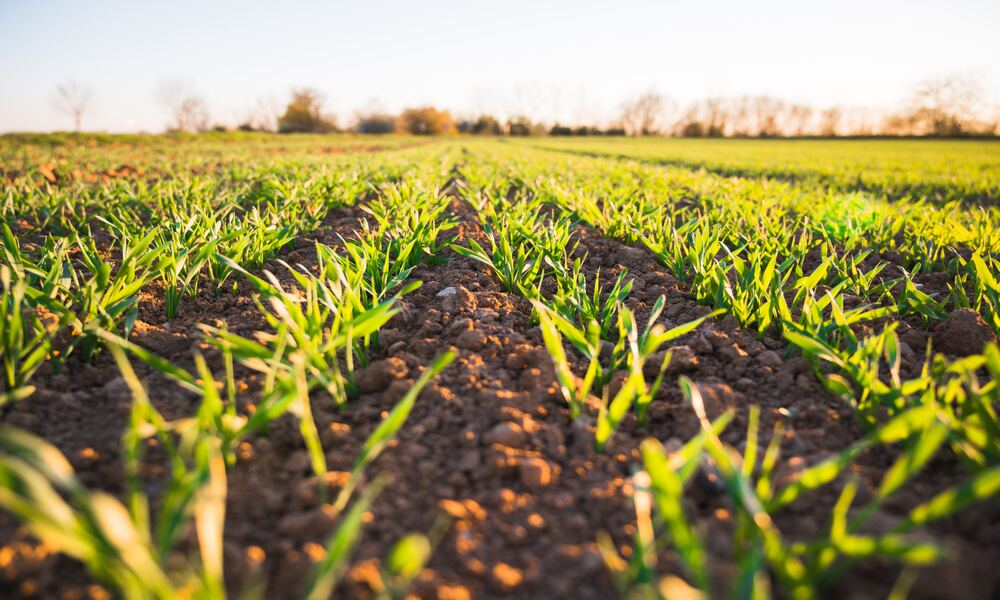In this month’s instalment of The Inside Track, I’ll be discussing my visit to Groundswell and my observations on the rapid change that’s currently taking place across the Ag sector in terms of improving agricultural sustainability through regenerative agriculture.
Groundswell was really well attended. When I visited on the first day, reported attendance was around 5000 and the event felt much more mainstream, with lots of well-known names exhibiting.
I went along to a number of presentations and the feeling I came away with was that the messaging was saying regenerative agriculture was the solution for everything. According to the people who were presenting, if you followed regenerative agriculture practices, there was no need for ag chemicals or inorganic fertilisers. That got me thinking about what a massive change and challenge that is for food production, food production systems and the people involved.
The challenge of changing mindsets
One of the biggest challenges will be to persuade farmers who have many years, often generations of experience in conventional farming to change their mindset and have the confidence to change their approach. Aside from the fact that you’re dealing with their livelihoods and their ability to ‘put food on the table,’ there has been huge investment over the years into making conventional farming more efficient. Now all of a sudden, you’re requiring that investment to change.
At a time when the need for environmental sustainability is paramount, switching to regenerative agriculture, when it’s explained in simple terms, sounds completely logical.
The five principles of regenerative agriculture, minimal soil disturbance, maximising crop diversity, keeping the soil covered, maintaining living crop roots, and integrating livestock all have logic. It’s the selling of this approach to more conventional farmers who may have spent decades ‘doing the right thing’ by monocropping wheat, barley and OSR for example, that is going to be a challenge.
A significant challenge is the phasing out of direct subsidies by 2027 in exchange for more active management through ELMS and SFI. By 2027, the BPS will be no more. That’s only four harvests. There’s a huge requirement for farmers to action change over such a short period of time and it’s going to create uncertainty and volatility.
Many farmers I’ve spoken to are asking ‘where do I start with it all?’ when being faced with such monumental change and the speed at which it’s required to happen.
What I think will probably happen is that farmers will change more slowly. There’ll be a gradual uptake of different elements of regenerative agriculture that will suit their farms and give them the confidence to keep on adapting, although inertia will be pushed by the rapidity of the subsidy transition.
The nuance of regenerative agriculture
One of the things that struck me when I was walking around Groundswell was that there were many businesses who were offering advice on specific issues. Each of these things could be completely new to a conventional farmer and would require a deep dive to obtain all of the new knowledge.
For me, it shouldn’t be a ‘them and us’ situation, where regenerative farming is absolutely right and conventional farming is wrong. There are so many things that happen on either side and there’s a lot of common ground.
I think all farmers want to do the right thing, it’s just understanding what the right thing is for their farm and how it fits into the future vision of food production. There’s no blueprint for regenerative agriculture, no ten steps to follow and you’re there. It’s so nuanced and so dependent on the individual farm, topography, cropping history, soil type, and many other things.
History in the making?
Some people will argue for the status quo that they know and understand, yet change is being forced upon the Ag industry, and quite rightly. We need to protect our soils to reduce the polluting effects of intensive agriculture, and we need to be more in tune with nature as there’s a symbiotic relationship between the two. However, achieving this will require changing what has been 60 years of rapid intensification of food production.
In years to come, we may reflect on this as a period in agricultural and food production history, where the way we approach food production and nature enhancement was transformed. Of course, change won’t be so easy for many , and we may see a rapid intergenerational handover which triggers its own issues. There’ll surely be a lot of serious conversations around the kitchen table.
The challenge of adapting for a robust future
One of the things that concerned me at Groundswell was that few conventional farming players were present. There were no fertiliser manufacturers or chemical manufacturers to be seen. The organisers might say they don’t see those businesses having a future in regenerative agriculture.
But it’s a little bit like the fossil fuels debate. During the transition from one thing to another, you don’t just switch one off and start using the other.
There’s a lot of research that sits with conventional systems that is relevant to regenerative agriculture. I think there needs to be more collaboration between the two systems because they will eventually blend together.
It’s a fascinating time to be involved in agriculture. Not only are there the changes around food production and nature, land is also being seen as a significant player in removing carbon to achieve net zero as well as a source of renewable energy through wind and solar power.
The challenge for farmers is how do they adapt their businesses to ensure a robust future? Not just a make ends meet future, but one that allows for reinvestment and a vibrant rural economy.





